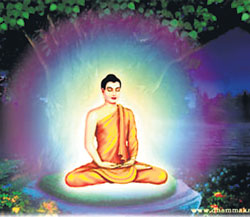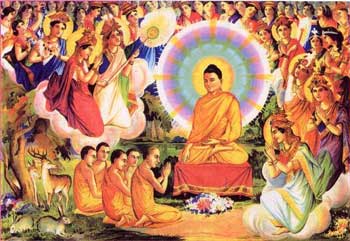The thrice-blessed day in the month of May
On the full moon day of May in the year 623 B.C., a prince was born in the Lumbini Park at Kapilavattu on the Indian borders of present Nepal. His father was King Suddhodana and mother was Queen Maha Maya. On the fifth day after his birth, the prince was named Siddahartha which means "wish fulfilled." His family name was Gotama.
At the age of sixteen, he married Princess Yasodara and led a happy wedded life for 13 years. His life was a luxurious one. One day when he was out of the palace and on his way to the pleasure park, he saw an old man, a diseased person and a corpse. These made him think and soon he realized the inevitable nature of life. One becomes old, falls sick and ultimately dies. He also saw a hermit, which sight signified the means to overcome the ills of life and achieve peace. Convinced of the worthlessness of sensuous pleasures, he decided to leave the palace in search of calm and peace.
It was the night his son Rahula was born, that he chose to quit. With his charioteer Channa to saddle the horse Kanthaka, Prince Siddhartha left. Crossing the river Anoma, he shaved his hair and beard and handed over his garments and ornaments to Channa and asked him to return to the palace.
Wearing a simple yellow robe of an ascetic, he started a life of poverty. The 29-year old prince who lived in the lap of luxury was now a penniless wanderer. He had no permanent place to live. He slept either under a shady tree or in a cave. He had no belongings except for a bowl to collect any food he got and robes just sufficient to cover his body. He was on a quest to find the Truth.
He met several teachers but was not convinced that what he learnt from them was what he was looking for. Passing through the district of Magadha he arrived at Uruvela, the town of Senani where he found a lovely spot of ground, a charming forest grove, a flowing river with sandy fords in an area where it was not easy to find food. He decided on a life of severest austerity. He tried it out for six years during which time he was reduced to a virtual skeleton. He tormented the body so much. Still he could not achieve his goal.
 |
Having realised the futility of self-mortification, he contemplated on the need to have physical strength to pursue spiritual progress. He decided to nourish the body sparingly and started taking some food. He abandoned the extremes and conceived the idea of the Middle Path. Through his own efforts he reached Enlightenment – also on the full moon day of May – and thereafter came to be known as Buddha Gotama. Thus he was not born a Buddha but became a Buddha by his own efforts.
Before Enlightenment, he was known as Bodhisatta meaning 'one who aspires to become a Buddha.' As the renowned monk Venerable Narada explains in 'The Buddha and His Teachings,' that is a period of intensive exercise and development of the qualities of generosity, discipline, renunciation, wisdom, energy, endurance, truthfulness, determination, benevolence and perfect equanimity.
Who is a Buddha? Buddha Himself has said "He is the Accomplished One ('Tathagata'), the Worthy One ('Araham'), the Fully Enlightened One ('Samma Sambuddha').
"As a lotus fair and
lovely,
By the water is not soiled,
By the world am I not soiled;
Therefore, brahmin, am I Buddha"
– he told a Brahmin once.
After Enlightenment, the Buddha travelled the length and breadth of India, preaching for forty five years and on his 80th year realized it was time for him to pass away.
Accompanied by Venerable Ananda, Buddha's chief attendant, the Buddha reached the Sala grove belonging to the Malla kings, quite exhausted, having suffered a bout of dysentery. He asked Venerable Ananda to prepare a couch between two Sal trees and laid Himself down on His right side with one leg resting on the other, mindful and self-possessed. Having preached to his disciple monks, he peacefully passed away – again on the full moon day of May.
Thus the Birth, Enlightenment and the Passing Away of the Buddha occurred on Vesak Pasalosvaka Poya – the full moon day in May which we now commemorate both by way of following the path of the Buddha, as well as paying homage to Him through numerous offerings and pious deeds. |


